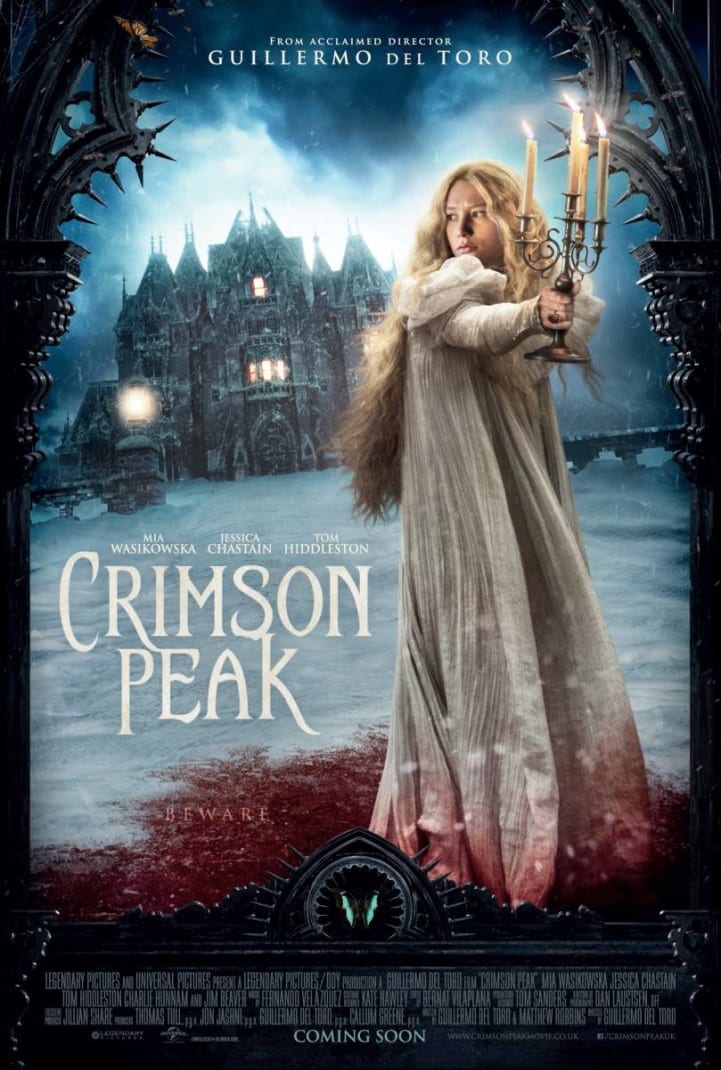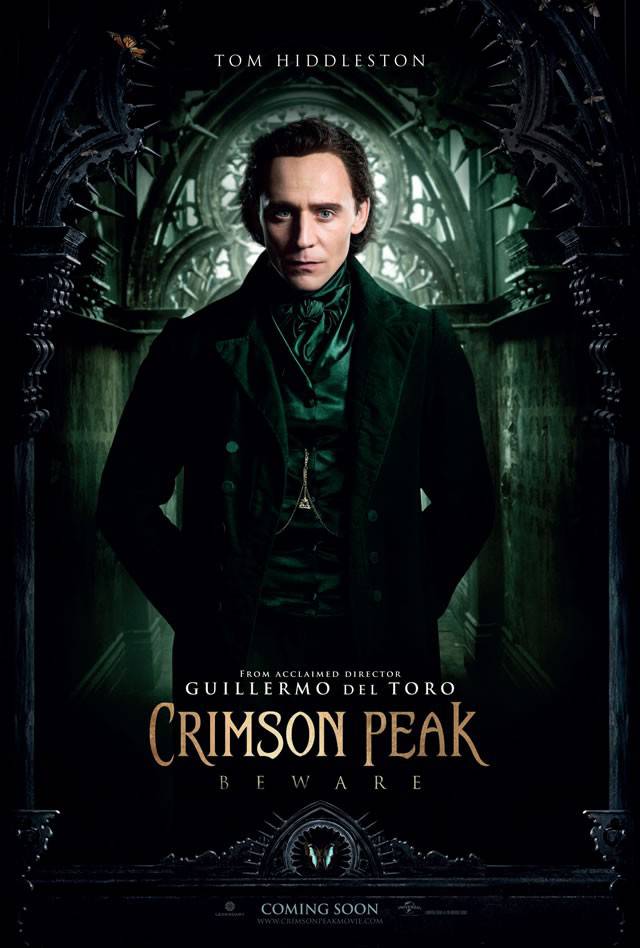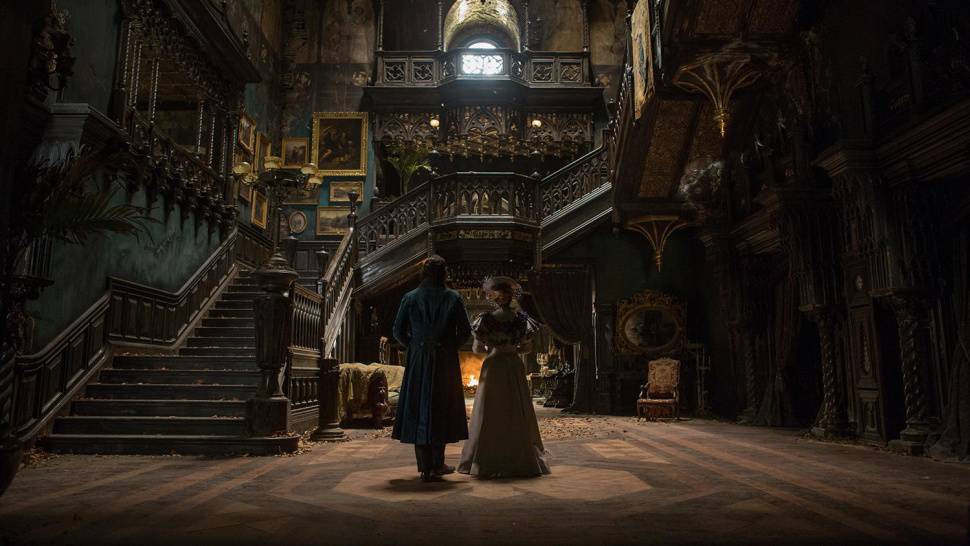Movie Review: CRIMSON PEAK (R)
Guillermo del Toro returns with a sumptuously crafted Gothic romance that isn’t so much interested in using ghosts to scare us as it is in showing us how ghosts are born. And in fact, some viewers might be a little disappointed to learn that “Crimson Peak” is more of a love story, a tale of redemption, and a movie about people than it is a film about terrifying apparitions. As this film so eloquently suggests early on, “Ghosts are a metaphor for the past.”
 In “Crimson Peak,” young and naïve writer, Edith Cushing (Mia Wasikowska), finds herself drawn to mysterious stranger Thomas Sharpe (Tom Hiddleston). Against the wishes of her reputable and stern father, Carter Cushing (Jim Beaver), and much to the dismay of childhood friend Alan McMichael (Charlie Hunnam), Edith pursues Thomas. Following an unforeseen tragedy, Edith continues her courtship with this handsome stranger. The whirlwind romance eventually finds the writer moving in with Thomas and his bitter sister, Lucille (Jessica Chastain), in a rundown, sinister-looking manor located in an isolated section of the countryside. It doesn’t take long for Edith to discover that this particular manor has many secrets.
In “Crimson Peak,” young and naïve writer, Edith Cushing (Mia Wasikowska), finds herself drawn to mysterious stranger Thomas Sharpe (Tom Hiddleston). Against the wishes of her reputable and stern father, Carter Cushing (Jim Beaver), and much to the dismay of childhood friend Alan McMichael (Charlie Hunnam), Edith pursues Thomas. Following an unforeseen tragedy, Edith continues her courtship with this handsome stranger. The whirlwind romance eventually finds the writer moving in with Thomas and his bitter sister, Lucille (Jessica Chastain), in a rundown, sinister-looking manor located in an isolated section of the countryside. It doesn’t take long for Edith to discover that this particular manor has many secrets.
“Crimson Peak” is stunning to look at; there’s no doubt about that. The production design—most notably the gorgeous Gothic dilapidated manor where most of the story unfolds, a manor that literally bleeds—is absolutely spectacular, as is the stellar cinematography and the lush costumes. Del Toro uses all of these things to his utmost advantage. If only his screenplay (which he co-wrote with “Dragonslayer” scribe Matthew Robbins) were at the same level as the production design.
It’s not that “Crimson Peak” is bad. Far from it. In fact, there is quite a bit worth recommending here, and if you watch this film from a Hammer Horror perspective, you’re likely to get sucked into del Toro’s passionate vision hook, line, and sinker. However, the truth is, while offering up a few spooky moments and atmosphere to spare, “Crimson Peak” isn’t particularly scary.
Furthermore, the CGI work actually hurts the film. With all due respect to amazing creature performer Doug Jones (his movements here are as astonishing as always), one might argue that not showing the ghosts might have been more effective. As it stands, most of the creations here are along the lines of what we saw in Andres Muschietti’s “Mama.” Granted, “Crimson Peak” as a whole leaves a stronger impression.
 Having said that, this isn’t the first time del Toro has told a story about the tragic memories that haunt us, and it most certainly isn’t his first foray into the land of ghosts. “Devil’s Backbone” is significantly more effective as a tale about a “haunting.” Even A. Bayona’s “The Orphanage,” an emotionally charged ghost story in which del Toro served as a producer, was more intriguing and hard hitting.
Having said that, this isn’t the first time del Toro has told a story about the tragic memories that haunt us, and it most certainly isn’t his first foray into the land of ghosts. “Devil’s Backbone” is significantly more effective as a tale about a “haunting.” Even A. Bayona’s “The Orphanage,” an emotionally charged ghost story in which del Toro served as a producer, was more intriguing and hard hitting.
For all its drama and sense of longing, “Crimson Peak” lacks the element of surprise. From a story standpoint, there are several moments that feel as if they were designed to surprise the viewer, when in fact, many of these specific moments are oddly predictable. Be it the ghosts’ agenda or the dark history behind the manor, this stuff is all fairly obvious in the context of the movie, but at the very least, the strangeness at the heart of the Thomas/Lucille bond provides a bit of a mystery.
Del Toro can be quite sly. When a storyteller has the ability to bait viewers into assuming that a victim is going to be dispatched in a certain way but then flips the switch and takes the victim out in a decidedly different fashion, it can be quite exciting. Del Toro incorporates this technique a few times in “Crimson Peak.” In the first act, he suggests that perhaps a blade will be used as a weapon only to have a character’s demise end up being considerably more brutal. Sadly, del Toro attempts a similar tactic in the final act to less startling affect. Don’t worry, no spoilers here.
“Crimson Peak” offers up three strong central performances (four, if you count the manor), the standout being an icy cold Jessica Chastain. And props to del Toro for managing to bring out a lot of personality in supporting player Charlie Hunnam, which was pleasantly surprising given how stiff the rugged “Sons of Anarchy” star was in “Pacific Rim.” The cast does their very best to bring an element of class to “Crimson Peak,” and aside from a few cheesy moments and an appearance by a slightly miscast Jim Beaver, all appear to be up to that challenge.
As for the R-rating, your guess is as good as mine. There’s a tastefully done sex scene and a couple of shocking moments in the final act, but by and large, “Crimson Peak” straddles the line between R and PG-13 in very much the same way “The Conjuring” did. Another reason to be completely baffled by the MPAA, but that’s a topic for another article.
In the end, “Crimson Peak” is a mixed bag. Del Toro really does direct the hell out of this thing, and there’s no doubt that his heart is in it every step of the way, but again, the story doesn’t quite hit that sweet spot. As beautiful as this movie is to look at, there are too few surprises to be found, and while del Toro’s emphasis on love, redemption, and the memories that haunt his characters lend “Crimson Peak” some much needed depth, they sort of drain the movie of that horror element many viewers might be hoping for.





For my edification and the improvement of my work, I would genuinely be interested to know precisely what you mean when you say I was “slightly miscast.” Is it because this sort of character is not what you’re used to seeing from me, or because I was not good enough at playing him, or that you imagined a different sort of actor in the role? I’ve played gruff but lovable demon hunters, gold prospectors, countless sheriffs, killers, village idiots, the king of England, a stuttering mental patient, and a dying Scots soldier. I’m at a loss to understand why you think I was wrong for this role. It would be helpful to me to know your specific objection. I presume you had strong, articulable reasons. Thank you so much.
Jim Beaver
Mr. Beaver,
Firstly, it should be noted that I am a fan of your work. Particularly on “Justified.” This is not me back peddling in any way. Secondly, you’re right. I was rather vague in my critique. This is to say that on a purely personal level, Carter Cushing felt a bit out of the time period to me. Not that I ever lived in that particular time period mind you, but in the context of the film there was something a bit off. Coming from a movie fan perspective, I certainly had no strong objection to your being cast in the role. Again, I’m a fan and admirer of your work. It’s just a feeling I had as I watched the movie. Your portrayal of Carter took me out of the film on a couple of occasions. Perhaps it’s your gruffness in the role, or perhaps it was the idea that the majority of the other characters-as written-felt more authentic to the time period, or perhaps it’s just my being used to you in other projects. Maybe a culmination of all three. Again, just a feeling I had as I watched “Crimson Peak.” Having said that, I remain an admirer of your work and apologize for not elaborating a bit more. In the context of my overall thoughts in regard to “Crimson Peak,” that “slightly miscast” comment probably came out of left field. I hope my comments here offer up a bit of clarification on the matter. I look forward to seeing your work in future projects.
Best,
Adam Mast